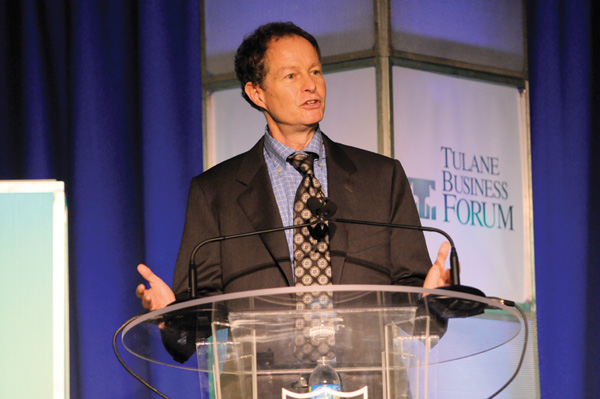
John Mackey, co-founder and CEO of Whole Foods Market Inc., argued for a new paradigm of business that puts purpose over profits in his Tulane Business Forum presentation.
Capitalism has gotten a bad rap lately, and John Mackey thinks that’s a bad thing.
“Day in and day out, we’re bombarded with the failure of capitalism,” said Mackey, co-founder and CEO of Whole Foods Market Inc., which operates more than 270 stores in the U.S., Canada and the United Kingdom. “I don’t believe that. I don’t believe capitalism is at fault for the troubles we’re going through today.”
Mackey visited New Orleans in October to deliver the luncheon keynote presentation at the 2009 Tulane Business Forum. The forum, an annual presentation of the Tulane Association of Business Alumni (TABA), took place at the Hilton New Orleans Riverside.
The theme of this year’s forum was “Corporate Consciousness,” and Mackey, an outspoken free-market advocate, used the opportunity to reaffirm his faith in the power of capitalism while at the same time arguing for a new business paradigm that puts purpose above profits.
“Corporations have done a very poor job of defending capitalism,” Mackey told the luncheon audience. “What the world needs is a new vision of the way business and capitalism could and should be, which I call conscious capitalism.”
In Mackey’s view, conscious capitalism boils down to the belief that businesses should have a higher purpose than the pursuit of profits.
“If you ask people what the purpose of a business is, the general answer you’ll get is to make money,” Mackey said. “If you think about it, that’s an odd answer. If you ask what the purpose of a doctor is, they won’t tell you it’s to make money. They’ll tell you it’s to heal sick people. Or if you ask what the purpose of a teacher is, they’ll say it’s to educate. Why don’t we think of businesses as actually serving a purpose as opposed to maximizing profits?”
The best way to maximize profits, Mackey said, is not to make profits a primary goal.
“To maximize profits over the long term, put your deeper business purpose first, whatever that may be for your organization,” Mackey said. “If you have a commitment above all else to satisfying your customers and if you care about the people that work for you and try to help them flourish in their jobs so they can personally grow, you’ll find that they serve the customers and the customers reflect back to you additional sales and therefore great profits.”
In the case of Whole Foods, Mackey said the company’s purpose has evolved over time, progressing from a focus on providing outstanding customer service to a much more ambitious mission to change and improve the world.
“I really resisted this idea, but the team members wouldn’t let me get away with it,” Mackey said. “They are committed to Whole Foods having a larger world impact and changing and improving world, so that’s why I’m out here talking, hopefully trying to fulfill that principle.”
In addition to Mackey, the forum featured presentations by Alan R. Yuspeh, senior vice president and chief ethics and compliance officer at HCA; Gary Jay Saulson, director of corporate real estate with the PNC Financial Services Group, a pioneer in green building; and Mark Quartermain, president of Shell Energy North America.
There was also a panel on alternative energy and financing featuring Jon Guidroz, director of project development with Free Flow Power Corp., a hydropower company that plans to install turbines in the Mississippi River and elsewhere; D’Juan Hernandez, president and CEO of Sun Energy Group, which plans to build a plant to convert municipal waste into energy; and Eldon Klaassen, CEO of Allegro, a provider of energy trading and risk management solutions for the energy industry.
